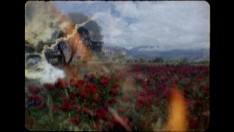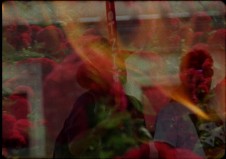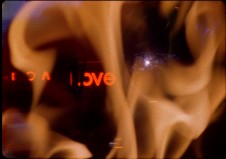Colectivo los ingrávidos: The Sun Quartet

The Sun Quartet, part 1: Sunstone (2017)
Los Angeles Filmforum and Whammy! present
Colectivo los ingrávidos: The Sun Quartet
Saturday November 5, 2022, 7:30 pm
At Whammy! Analog, 2514 Sunset Blvd. Los Angeles, CA 90026
Entrance in rear off Rampart!
In person: Davani from Colectivo los Ingrávidos
Dedicated to the memory of Amy Halpern.
Note the change in location day, and ticket prices.
Tickets: $12 general, $6 students/seniors, Whammy! and Filmforum members
At https://www.whammyanalog.com/events/colectivo-los-ingravidos-the-sun-quartet-presented-by-la-filmforum
Masks are still required at Filmforum shows - N95 or KN95.
For more event information: www.lafilmforum.org, or 323-377-7238
Filmforum has commissioned five artists to make new work, generously funded by the Mike Kelley Foundation for the Arts, and over the next year will be presenting the premieres of the works, including discussions with the artists. We are delighted to welcome Colectivo los ingrávidos from Mexico for two public screenings, one at Whammy! Analog on November 5, and one at 2220 Arts on Sunday November 6.
In the November 5th program, we present The Sun Quartet, four films bonded by their poetic and ecstatic examination of politics and political traumas in Mexico. Their films are real knockouts, highlights of any mixed program in which they are included, stunning to eye and ear, opening new possibilities for “experimental film.” Prepare to be dazzled. Stephe broomer has written an extended essay on these films, excerpted below. We may also add an earlier short film or two to the program
“The experimental filmmakers known as Colectivo los ingrávidos formed in Tehuacán, Mexico, in 2012. They adopted their name, which translates into English as ‘the weightless’, from the title of the first novel of Mexican author Valeria Luiselli, a novel that examines acts of translation that play out in three parallel lives against a backdrop of Spanish-language literary culture in North America. Inspired by Luiselli’s themes—of translation, displacement, and the imaginative reconstruction of identity—los ingrávidos posed a challenge to the repressive ideology evident in mainstream cinema. They have pursued the radical, alternative grammar of poetic filmmaking, contesting cultural officialdom, cherishing ecstatic communions with the natural world, and tethering aesthetic experience to social support and free will. Any description of the collective as a cohesive unit must also acknowledge the diversity of their processes, from diaristic visions of life in contemporary Mexico, to found footage and digital abstraction. The films and videos of los ingrávidos are signed in solidarity, under a collective banner, and yet express by this medley a restless collision of forms, fashioned together in love and outrage.” – from “Revelations By Sunlight: Translation, Monument and Metaphor in Los Ingrávidos’s The Sun Quartet” by Stephen Broomer

The Sun Quartet, part 1: Sunstone
The Sun Quartet, part 1: Sunstone
2017 / 16mm transfer to digital / color / silent / 8' 24 / LA premiere

The Sun Quartet, part 2: San Juan River
The Sun Quartet, part 2: San Juan River
2017 / 16mm transfer to digital / color / sound / 12' 50 / LA premiere

The Sun Quartet, part 3: Conflagration
The Sun Quartet, part 3: Conflagration
2017 / 16mm transfer to digital / color / sound / 16' 22 / LA premiere

The Sun Quartet, part 4: Far from Ayotzinapa
The Sun Quartet, part 4: Far from Ayotzinapa
2017 / 16mm transfer to digital / color / sound / 22' 35 / LA premiere
“The Sun Quartet confronts the climate of corruption and violence that dominates contemporary Mexican leadership and militarism. Across its four parts, the series exemplifies the poetic operations of the collective, who reconcile elements ranging from improvisational music, superimposed cinematography, poetic texts both read and cast on screen, and documentation of protests. These elements assemble as a counter to official claims to truth regarding traumas as recent as the 2014 disappearance of 43 students from the Ayotzinapa rural normal school that happened in Iguala, Mexico, and as distant as the 1968 Tlatelolco massacre, a formative event in contemporary Mexican revolutionary consciousness. The Sun Quartet also summons resonances of older, unspeakable traumas, more distant still, rifts that recede deep into the past of Mexico, its genocides and massacres, the predation done in its name, its significance as a theatre to colonial ambitions. The Sun Quartet mixes phenomenological fascination with the terrifying climate of contemporary Mexican governance and the historical foundations of that terror.
“Los ingrávidos turn to poetic realms, away from explication and didacticism, embracing instead visible phenomena and suggesting that invisible thread of experience that links the personal and the political. They recognize it in the penetrating gaze of the protestors, the marching throng of the crowd, the cloud cover of an overcast sky, the petals of sunflowers, the flesh of a watermelon, superimposing flames and cornstalks and skyscrapers, an uncomfortable reconciliation of past and present that interweaves agrarian and urban ideals. The collective recognizes the incapability of conventional ‘storytelling’ to account for so fragmented and mysterious a subject as the Ayotzinapa disappearances. The disappearances are a broken narrative that defies the conventional grammar of cinema and media, a testament to the paradoxical nature of truth; official versions are inevitable simplifications, in which ‘truth’ is an outcome of coerced testimonies, false witness, and a forsaking of responsibility for those in power. Los ingrávidos pose in turn a form that allows for the fabric of reality to become porous; that allows for poetic texts that speak truth to power and that allude to the spiritual core of resistance; and that allows for acts of witness that are truer to the ecstasies and sorrows of memory and perception. This poetic cinema is as concerned with values of light, composition and texture as it is with the rhetorical power of the chants, songs and call-and-response of protestors. Through this marriage of aesthetic improvisation and righteous testimony, The Sun Quartet gains its monumental character.” – excerpt from “Revelations By Sunlight: Translation, Monument and Metaphor in Los Ingrávidos’s The Sun Quartet” by Stephen Broomer, in Cinema Scope
